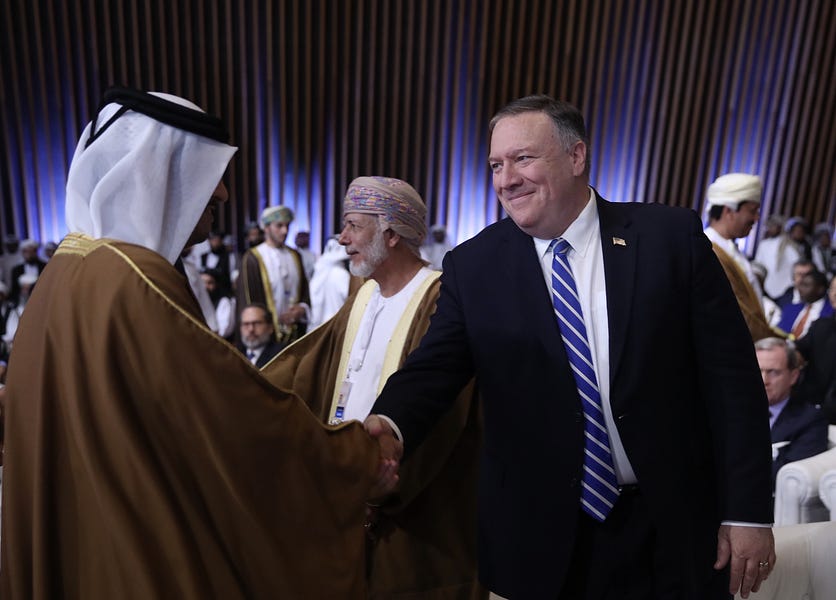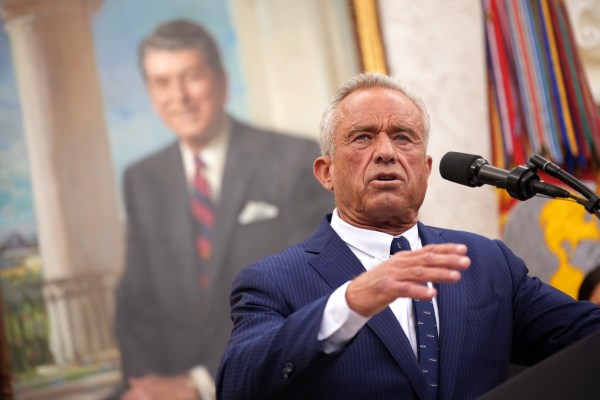On October 7, 2001, the United States of America went to war in Afghanistan. Weeks earlier, al-Qaeda had killed nearly 3,000 Americans in the most devastating terrorist attack in history. Those kamikaze raids had been planned on Afghan soil, one in a series of plots specifically designed to kill Americans around the world. Both the Clinton and Bush administrations tried to avoid war. On more than 30 occasions between 1996 and the summer months of 2001, the U.S. government asked the Taliban to turn over Osama bin Laden. The Taliban didn’t budge. After Taliban founder Mullah Omar defied the U.S. one more time in late September 2001—saying bin Laden’s safe haven in Afghanistan was a matter of “Islam’s prestige”—the U.S. was left with no choice. The Americans retaliated against al-Qaeda and Taliban targets, overthrowing the Islamic Emirate of Afghanistan—the same authoritarian regime that had harbored Osama bin Laden all along.
On February 29, 2020, the United States of America capitulated to the Taliban. President Trump, Secretary of State Mike Pompeo, and Special Representative Zalmay Khalilzad now want Americans to believe that the Taliban is our counterterrorism partner. Secretary Pompeo insists that after nearly 25 years of fighting side-by-side with al-Qaeda, the Taliban is finally going to betray its jihadi brethren. The Taliban is even going to “work alongside of us to destroy” al-Qaeda, Pompeo claims.
There is no good reason to believe this is true.
To be sure, many Americans are tired of talking about and spending their tax dollars on the war. Some soldiers have been asked to deploy to the country multiple times, shouldering a burden the rest of us do not share. It is understandable that many just want out. The world has changed greatly since 2001, but the U.S. military is still there—a seemingly improbable outcome given the perceived successes of the initial U.S.-led invasion.
But the desire to leave Afghanistan does not require the U.S. State Department to submit to the Taliban. A bad deal, based on American credulity and servility, is not necessary to leave the country. No deal is better than a bad deal. And make no mistake about it: The Trump administration’s accord is strikingly weak. It is not a peace deal. Do not call it that. The Taliban’s men are attacking Afghan military outposts and security forces as I write this. It was a bilateral withdrawal agreement—a desperate attempt to wash America’s hands of Afghanistan before the 2020 presidential election.
A lopsided deal in the Taliban’s favor.
The negotiations began in late 2018 and legitimized the Taliban as a political entity from the start. The Obama administration walked away from similar talks with the Taliban in 2013, after the Taliban insisted on calling itself the Islamic Emirate of Afghanistan—the same regime that stood by Osama bin Laden’s side. Using that name demonstrated that the Taliban had no real desire for peace, no willingness to give up its totalitarian dream, which is a nightmare for many Afghans. The Taliban never did give up the name. The U.S. simply accepted that the Taliban is going to use it. The Trump administration’s Doha accord is littered with references to the “Islamic Emirate of Afghanistan.” The State Department inserted language, somewhat clumsily, ensuring readers that it does not recognize this entity’s legitimacy. The Trump administration’s actions, including sending Secretary Pompeo to Doha, the first Cabinet-level official ever to meet directly with the Taliban, tell a different story. After the deal was struck, President Trump himself called the Taliban’s signatory and boasted of their good relations.
Indeed, the whole negotiating process empowered the Taliban’s Islamic Emirate in ways the jihadis never could have imagined in 2001. The Taliban continues to insist that the Afghan government is America’s “puppet”—and the State Department has validated this talking point. When the Taliban demanded in late 2018 that the Afghan government, America’s putative ally, be excluded from the talks, Khalilzad and Pompeo quickly acquiesced. Therefore, the resulting Doha accord is a bilateral one. What’s worse, it doesn’t include a single tangible benefit for America’s Afghan partners, the same forces that have sacrificed more blood to contain the jihadis than anyone.
However, the Taliban did extract concessions that bolster its chances of success. The Taliban wouldn’t agree to a ceasefire—something even Khalilzad concedes is necessary for real peace. A ceasefire will merely be one item on the table if the Taliban ever actually sits down with the Afghan government. In the meantime, the State Department agreed to facilitate the release of up to 5,000 Taliban fighters held by the Afghan government in exchange for 1,000 detainees imprisoned in the Taliban’s detention system. Naturally, the Afghan government is resisting this uneven exchange, which merely gives the Taliban more personnel to wage jihad before it has engaged in even one minute of “intra-Afghan talks.”
If the Obama administration had agreed to this 5-to-1 swap in favor of the Taliban, you can be sure Trump would have taken to Twitter to criticize it. That’s exactly what he did in 2014, when the Obama team agreed to exchange five senior Taliban figures held at Guantanamo for Bowe Bergdahl, a who abandoned his fellow soldiers on the battlefield.
Trump derided the “‘brilliant’ negotiators” who “gave up five Taliban leaders for one traitor,” questioning this same team’s ability to make “trade deals with China & others.” Trump added: “No chance.” But now, Trump’s own diplomats have agreed to the same type of uneven concession, only on a much bigger scale, with the Taliban’s political team. Strikingly, the Taliban’s team in Doha actually includes the same five senior jihadists whose release earned Trump’s condemnation.
The State Department also agreed to remove Taliban leaders and other figures from international sanctions lists. The U.S. and its allies have used this monitoring system to crack down on the terrorists’ illicit financing. As the U.S. Treasury Department has repeatedly found, Taliban fundraisers often also work for al-Qaeda, as well as other regional and international terrorist groups. The Haqqanis, who own a significant share of the Taliban’s operations, are intertwined with al-Qaeda. And their fundraising apparatus stretches far outside of South Asia, to countries throughout the Gulf. The Haqqanis and al-Qaeda have benefited greatly from Gulf petrodollars. While the agreement doesn’t specify which Taliban figures will be delisted, it could be all of them, including the Haqqanis’ bagmen. This would almost certainly benefit al-Qaeda.
Pompeo endorses the Taliban as America’s counterterrorism partner.
From Secretary Pompeo’s perspective, the Taliban’s supposed counterterrorism assurances are major concessions. But the text of the written agreement does not support Pompeo’s claims. There’s what the Taliban has allegedly agreed to do, and then there is what Pompeo has told Americans the Taliban has said it would do. Pompeo has put a lot of words into the Taliban’s mouths that the Taliban’s leaders haven’t spoken—or written.
According to Pompeo, the Taliban’s leaders “for the first time, have announced that they’re prepared to break with their historic ally, al-Qaeda, who they’ve worked with much to the detriment of the United States of America. You can see, go read the document, the Taliban have now made the break.”
The Taliban hasn’t “announced” anything. The written agreement was signed by a Taliban political leader, Mullah Baradar, who was imprisoned by Pakistan for years and released solely so he could sign this deal. Baradar, a legacy Taliban leader, has no actual power on the ground in Afghanistan. None of the senior Taliban leaders who run the insurgency put their names on this agreement. It appears the U.S., Pakistan, and the Taliban used Baradar as a prop to grant the proceedings the appearance of gravitas.
Al-Qaeda is mentioned by name in the text twice. Both mentions, in back-to-back passages, include the same language. The Taliban claims it will “prevent any group or individual, including al-Qaeda, from using the soil of Afghanistan to threaten the security of the United States and its allies.”
That is not a “break” from al-Qaeda, nor is it a renunciation. And the Taliban has been saying something similar all along. Indeed, the Taliban claimed well before 9/11 that bin Laden was under control and posed no threat to the U.S. Obviously, that wasn’t true—and the Clinton and Bush administrations didn’t believe the Taliban’s representatives.
In more recent years, the Taliban has been saying something very similar. In February 2019—a year before the deal was consummated—the Taliban assured the world that it does “not allow anyone to use the soil of Afghanistan against other countries including neighboring countries.”
Note that this language, including the phrase “soil of Afghanistan,” is nearly identical to that included in the State Department’s deal. But it’s never been true. It wasn’t true in February 2019. And there is no reason to think it is true now. In fact, the State Department’s agreement does not include any verification or enforcement mechanisms, despite Pompeo’s assurance to Americans that the accord includes a “deep, complex, well-thought out, multi-month negotiated verification complex and mechanism by which we can observe and hold every member of the agreement accountable.”
At just over three pages long, there is nothing “deep” about the agreement. Nor is there any “verification complex.” While it is conceivable that such provisions are included in secret annexes that haven’t been released to the public, that’s not what Pompeo has said. He has told the public that the unreleased portions are merely “military implementation documents that are important to protect our soldiers, sailors, airmen and marines.” None of that applies to the Taliban’s counterterrorism assurances.
Khalilzad’s credulity.
There is an additional reason to be skeptical that months of negotiations led to a robust enforcement mechanism, as Pompeo claims. Khalilzad trusted the Taliban after just a few months on the job.
Khalilzad accepted the job as chief negotiator in September 2018. By January 2019, he was already satisfied with the Taliban’s counterterrorism assurances. It is improbable, to say the least, that Khalilzad solved this thorny issue in a matter of months. Over the course of more than two decades, three successive administrations—both Democrat and Republican—didn’t buy the Taliban’s counterterrorism lies. Suddenly, Khalilzad declared, all was well.
But all wasn’t well. In the 12 months that followed Khalilzad’s exoneration of the Taliban, the jihadis gave us every reason to doubt his claims. Throughout 2019, the Taliban continued to: fight alongside al-Qaeda, harbor its leaders, lie about the presence of al-Qaeda-affiliated foreign fighters and even blame America for the 9/11 hijackings. The Taliban’s ongoing collusion with al-Qaeda was documented by official reports published by the U.N. Security Council, the U.S. Department of Defense, and the Office of the Director of National Intelligence. While the Taliban said nothing about al-Qaeda’s presence, maintaining its longstanding and conspicuous silence, al-Qaeda continued to promote its allegiance to the Taliban’s Islamic Emirate.
Khalilzad and Pompeo didn’t budge. The Taliban’s word was still good,apparently. After Trump temporarily suspended the talks in early September 2019, Pompeo attempted to explain why his diplomatic efforts had borne fruit anyway. Pompeo alleged that the Taliban had agreed to “publicly and permanently” break with al-Qaeda. Two weeks later, a senior al-Qaeda leader named Asim Umar was killed during a joint U.S.-Afghan raid on a Taliban stronghold in Musa Qala, Helmand. Umar was living under the protection of a Taliban shadow governor—a man responsible for implementing the Islamic Emirate of Afghanistan’s policies.
Umar was the first emir of al-Qaeda in the Indian Subcontinent (AQIS), an organization founded by, and openly loyal to, al-Qaeda’s global leader, Ayman al-Zawahiri. The AQIS network stretches well outside of Afghanistan’s borders— to Bangladesh, Burma, India, Kashmir, and Pakistan—a fact belying the Taliban’s claim that it doesn’t allow any parties to threaten neighboring countries from Afghan soil. Umar had threatened America multiple times as well.
But Umar’s brotherhood with the Taliban didn’t matter to Pompeo or Khalilzad.
The facts never mattered.
In remarks in Doha, Pompeo announced proudly that America is now “restrained,” as if whitewashing the Taliban’s radicalism serves some “realistic” objective.
What a real Taliban break with al-Qaeda would look like.
Throughout all of this, the State Department hasn’t explained what it would take for the Taliban to truly renounce al-Qaeda, or break ties with its jihadi kin. It is doubtful that the men who led these talks even know.
The State Department’s agreement contains three provisions—none of which specifically name al-Qaeda, or any other terrorist group for that matter—that appear to be concrete, until you scrutinize the language and shallow logic underpinning them. The Taliban supposedly won’t cooperate with groups or individuals who threaten the U.S. or its allies, or allow these anti-American entities to recruit, train, or fundraise inside Afghanistan, or provide travel paperwork for international terrorists. The Taliban is supposed to “send a clear message that those who pose a threat to the security of the United States and its allies have no place in Afghanistan.”
While that may seem reassuring, the Taliban has simple workarounds and these provisions are actually vague—if you know the details. More importantly, the agreement doesn’t specify any enforcement or verification mechanisms. Even with many thousands of troops in country, the U.S. has had trouble locating al-Qaeda leaders and training camps embedded within the fabric of the Taliban’s insurgency. This task becomes still more difficult, if not impossible, as the U.S. draws down further, presumably to zero troops.
Another problem, out of many: Most of AQIS’s members do not threaten the U.S. homeland today. They are busy helping the Taliban reclaim territory for its Islamic Emirate. U.S. counterterrorism officials have told me that when AQIS jihadists are captured inside Afghanistan, they rarely self-identify as al-Qaeda members. Instead, they say they are the Taliban’s fighters. There are hundreds of AQIS fighters waging jihad on behalf of the Taliban today. Because the State Department didn’t explicitly address their role, the Taliban could easily say they are not international, anti-American terrorists, but instead local combatants, and therefore not subject to clauses released in Doha. Multiple other al-Qaeda and al-Qaeda-affiliated groups are similarly situated, embedded within the Taliban. These include Central Asian and Pakistani groups. For example, the Pakistani Taliban also operates in Afghanistan and fights on the Afghan Taliban’s behalf. The Pakistani Taliban, you’ll recall, placed a car bomb in Times Square in May 2010.
There is also an issue of timing. None of the Taliban’s so-called counterterrorism assurances are couched in a timeframe. One plausible reading of the agreement is that so as long as the terrorists don’t plot against the U.S. while American forces remain for (at most) 14 months, the Taliban is effectively in compliance. This would be true even if these same terrorists decided to lash out from Taliban strongholds at month 15, or month 20—that is, after the U.S. is scheduled to leave.
Secretary Pompeo indicates that he believes that the Taliban’s counterterrorism assurances will lead to an all-out war on al-Qaeda. “The gentleman [Taliban representative] whom I met with agreed that they would break that relationship and that they would work alongside of us to destroy, deny resources to and have al-Qaida depart from that place,” Pompeo said this past Sunday. Again, the text of the agreement doesn’t actually say that.
But what would an actual Taliban renunciation of al-Qaeda look like? What would it take for the Taliban to renounce al-Qaeda and “destroy” its organization inside of Afghanistan?
First, the Taliban would actually renounce al-Qaeda, by name, in a public statement. Such a message would decry the 9/11 hijackings, something the group has never done. The Taliban still blames American policies, not al-Qaeda, for the attack. The Taliban would also explain it was a mistake for Mullah Omar to defend and harbor Osama bin Laden. It’s been five days since the deal was finalized. The Taliban’s prolific websites have been silent with respect to al-Qaeda.
Second, the Taliban’s current top leader, Haibatullah Akhundzada, would disavow Ayman al-Zawahiri’s blood oath. Just as Osama bin Laden swore his personal fealty to Mullah Omar, Zawahiri has sworn an oath of allegiance (known as a bayat) to Akhundzada. This is a deadly serious matter for the jihadis. ISIS and al-Qaeda have argued about it since 2013, when Abu Bakr al-Baghdadi disobeyed Zawahiri’s commands. If Akhundzada were to disavow Zawahiri’s oath, it would be a blow to al-Qaeda not only inside Afghanistan, but globally. Jihadis everywhere from West Africa to South Asia have recognized Zawahiri’s oath to Akhundzada as a source of religious legitimacy, as they consider the Taliban emir a caliph in waiting, a potential ruler for all Muslims.
In a statement released shortly after the deal was struck in Doha, Akhundzada declared “victory” on behalf “of the entire Muslim and Mujahid nation.” He didn’t mention Zawahiri or al-Qaeda.
Third, Sirajuddin Haqqani would renounce al-Qaeda and Zawahiri, too. The New York Times recently published an op-ed attributed to Haqqani. Al-Qaeda wasn’t mentioned. Sirajuddin and his family have been deeply intertwined with al-Qaeda since the 1980s, when his father became one of Osama bin Laden’s earliest and most influential benefactors. You can read more on the Haqqanis and al-Qaeda here. Today, Sirajuddin is the Taliban’s deputy emir (No. 2) and military warlord, meaning he oversees most of the group’s operations. If Haqqani doesn’t disavow al-Qaeda, then that is another indication that there has been no real “break.”
Fourth, the Taliban would make specific commitments to uproot AQIS and the alphabet soup of other al-Qaeda-affiliated groups in Afghanistan. The State Department likes to talk about “confidence-building measures,” which invariably involve large concessions to the Taliban, in advance of meaningful talks. As one such “confidence-building measure,” the U.S. should have demanded that the Taliban betray at least some of the al-Qaeda men fighting for its Islamic Emirate. A high-profile betrayal would certainly inspire at least some confidence.
These are just four, concrete steps that could or should be taken before the secretary of state tells the American people that he believes the Taliban will be our counterterrorism partner. Any one of them would be a meaningful step toward a real break between the Taliban and al-Qaeda.
Even then, a realist would demand real verification and scrutiny before absolving the Taliban of its quarter-century alliance with the organization that struck America on 9/11.
In sum, the deal strengthens the Taliban and weakens America’s hand in the region. It legitimizes the Taliban in the eyes of jihadists worldwide and among the Afghan people and it amounts to a betrayal of the many brave Afghans who have fought alongside U.S. troops over the last 19 years. And the spin on behalf of the deal from top Trump administration officials has the effect of diminishing the ongoing threat the Taliban—and its deep relationship with al Qaeda—presents to the U.S., its interests and allies.
People of good will have different views about whether the U.S. should remain in Afghanistan or leave. But even those who favored ending America’s engagement there should oppose this ill-conceived agreement. No deal is better than a bad one.
Photograph of Mike Pompeo at the signing ceremony for the deal with the Taliban in Doha by by Fatih Aktas/Anadolu Agency via Getty Images.






Please note that we at The Dispatch hold ourselves, our work, and our commenters to a higher standard than other places on the internet. We welcome comments that foster genuine debate or discussion—including comments critical of us or our work—but responses that include ad hominem attacks on fellow Dispatch members or are intended to stoke fear and anger may be moderated.
With your membership, you only have the ability to comment on The Morning Dispatch articles. Consider upgrading to join the conversation everywhere.